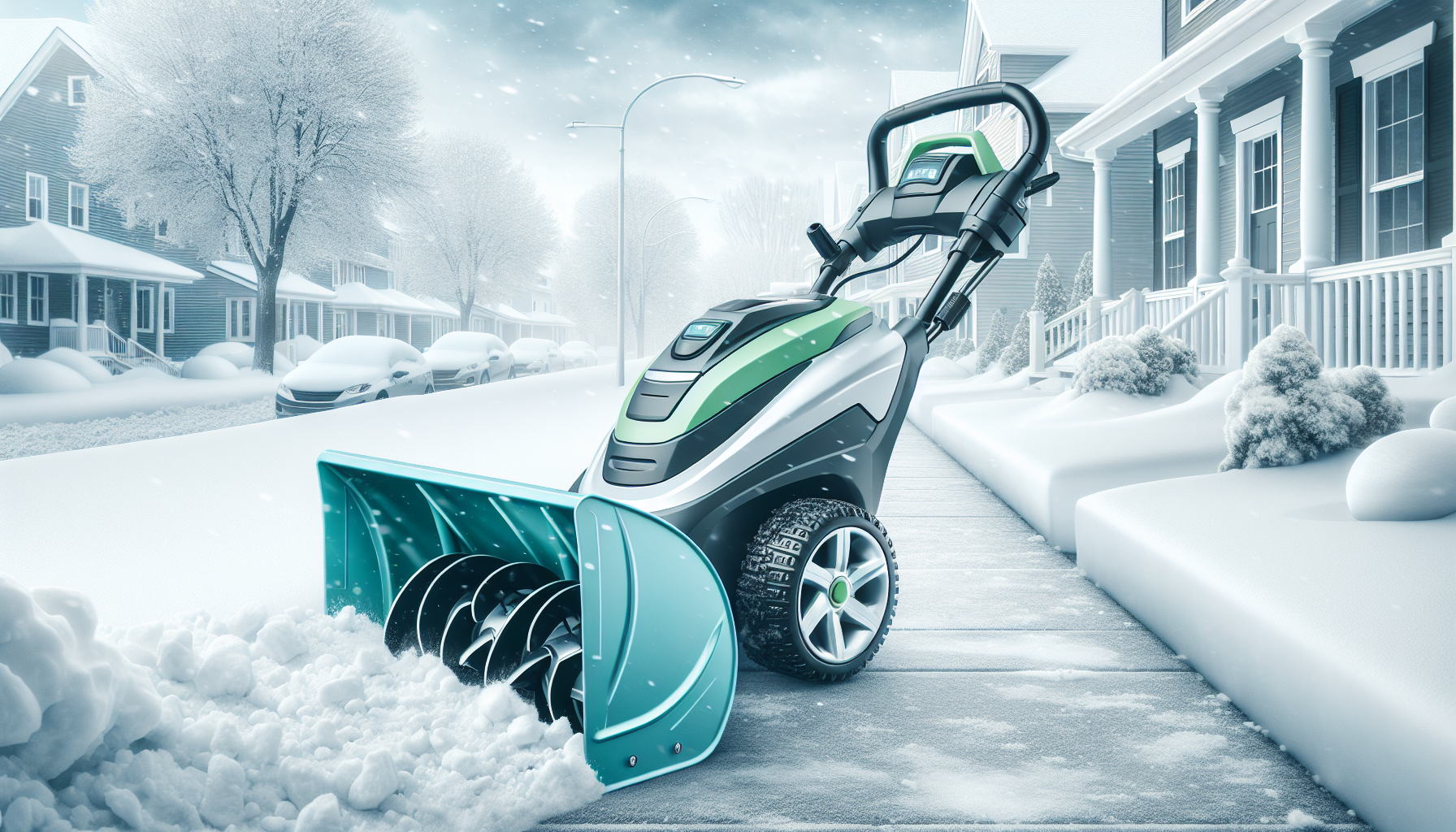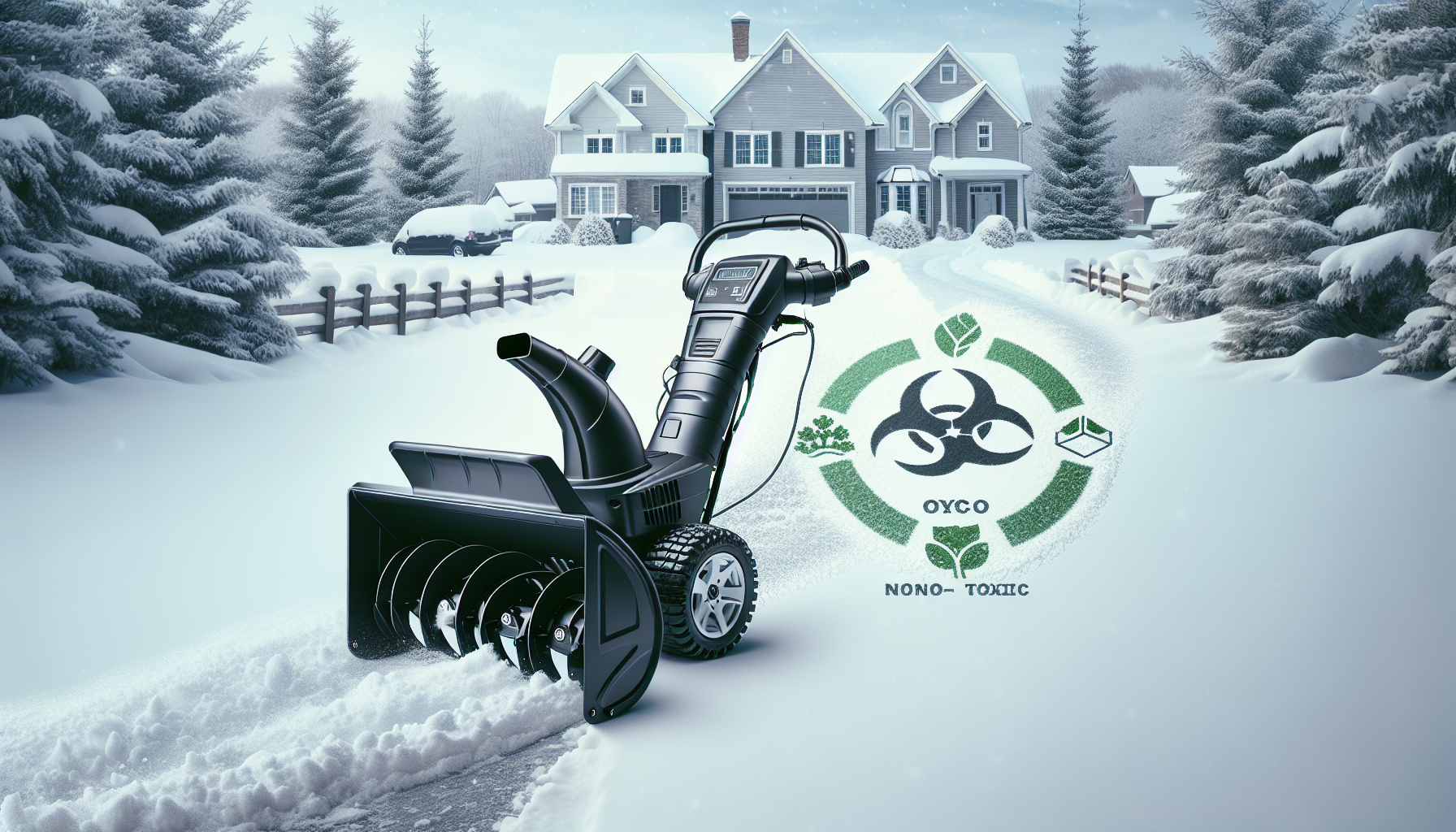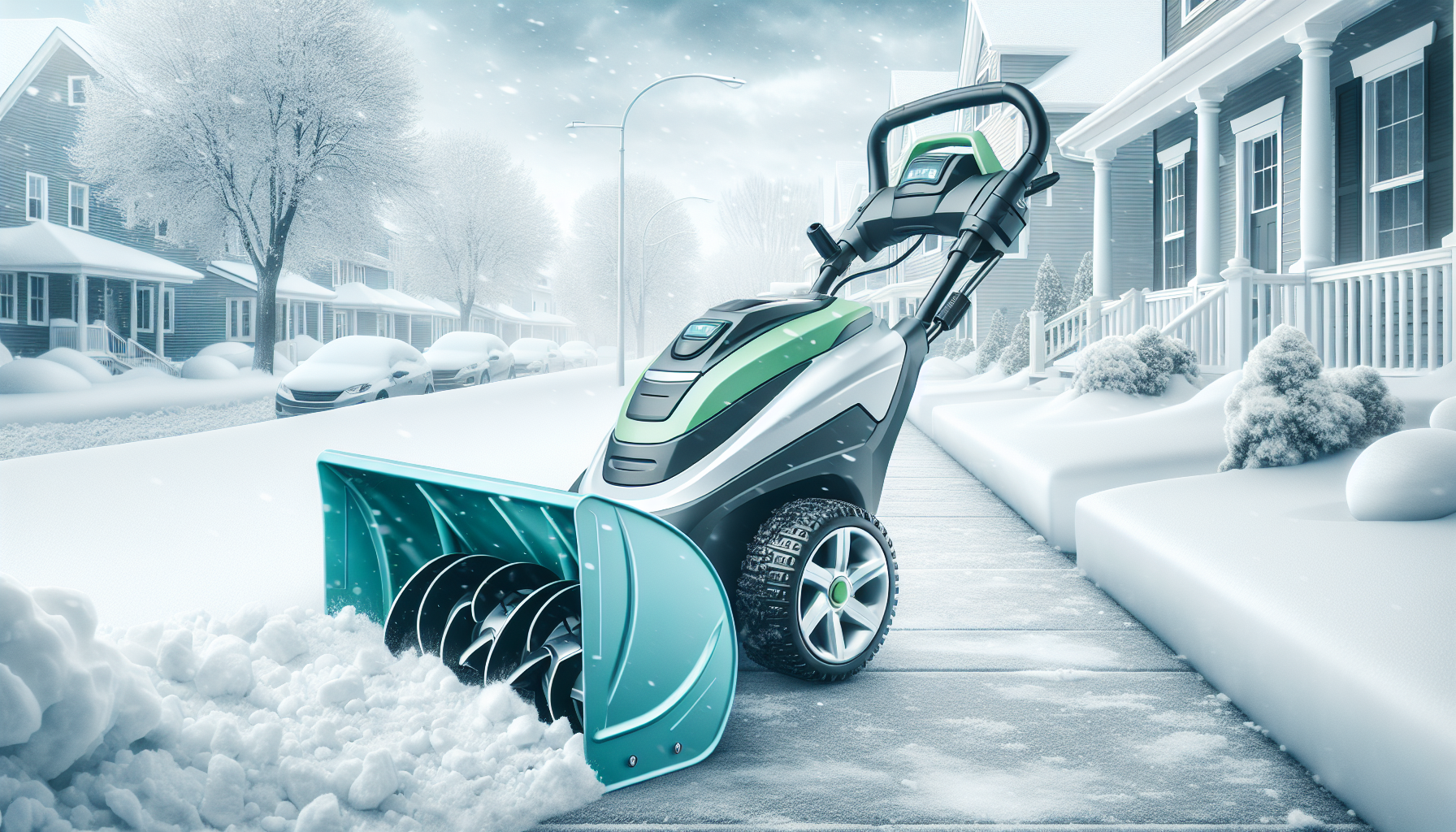When the snow starts falling and blankets everything in a serene white, it’s easy to forget about the back-breaking task of clearing your driveway and walkways. This is where electric snow blowers come into play, offering a convenient solution to tackle the snow and save you from hours of shoveling. But, you might wonder, are electric snow blowers effective? Well, fret not, as we’re about to explore the benefits and effectiveness of these modern marvels of snow removal. So, grab a warm cup of cocoa and let’s delve into the world of electric snow blowers!

Cost
Initial Cost
Electric snow blowers are generally more affordable compared to their gas-powered counterparts. The initial cost of an electric snow blower is typically lower, making it an attractive option for budget-conscious individuals. You can find a range of electric snow blowers at various price points, allowing you to choose the one that suits your budget.
Maintenance Cost
Electric snow blowers are known for being low-maintenance machines, which can save you money in the long run. Unlike gas-powered snow blowers that require regular oil changes, spark plug replacements, and fuel refills, electric snow blowers require minimal maintenance. This means you won’t have to spend money on frequent maintenance tasks, making them cost-effective options.
Operating Cost
Operating costs for electric snow blowers are generally lower compared to gas-powered models. Electric snow blowers run on electricity, which is typically cheaper than buying and refilling gasoline. Additionally, electric snow blowers don’t require oil changes or spark plug replacements, further reducing their operating costs. These savings can add up over time, making electric snow blowers a cost-effective choice for snow removal.
Power and Performance
Motor Power
Electric snow blowers come in various power capacities, ranging from smaller models suitable for light snowfall to more powerful models capable of tackling heavy snowfalls. The motor power of an electric snow blower determines its ability to clear snow effectively. When choosing an electric snow blower, consider the average snowfall in your area and select a model with sufficient motor power to handle the amount of snow you typically encounter.
Clearing Width
The clearing width of an electric snow blower refers to the width of the path it can clear in a single pass. Electric snow blowers typically have clearing widths ranging from 12 to 24 inches. A wider clearing width allows you to clear a larger area in less time, making the snow clearing process more efficient.
Throwing Distance
The throwing distance of an electric snow blower refers to the distance it can discharge snow away from the clearing area. While the throwing distance can vary between different models, electric snow blowers generally have a throwing distance of around 20 to 30 feet. Consider the size of your property and where you want the snow to be thrown when selecting an electric snow blower with an appropriate throwing distance.
Type of Snow
Electric snow blowers are effective in clearing all types of snow, including light powdery snow and heavier, wet snow. However, it’s important to note that electric snow blowers may have limitations when it comes to deep, heavy snow. If you often experience deep snowfall or live in an area with heavy, wet snow, you may need to choose a more powerful electric snow blower or consider a gas-powered model.
Ease of Use
Weight and Portability
Electric snow blowers are generally lightweight and easy to maneuver, making them suitable for individuals of all strength levels. They are typically lighter than gas-powered snow blowers, making them easier to lift and transport. The lightweight design also contributes to better maneuverability, allowing you to navigate around tight corners and obstacles with ease.
Start-Up/Shutdown
Starting up an electric snow blower is hassle-free compared to gas-powered models. With electric snow blowers, you simply need to plug them into a power source, and they can be started with the push of a button. There is no need to deal with pull cords, gas, or manual choke adjustments. Shutdown is equally effortless – just unplug the machine and you’re done.
Handling and Maneuverability
Electric snow blowers are designed to be user-friendly, with intuitive controls and easy-to-grip handles. These features provide a comfortable and secure grip during operation, allowing you to maintain control while moving the snow blower. The lightweight nature of electric snow blowers also contributes to their excellent maneuverability, making it easier to navigate through tight spaces and maneuver around obstacles.
Noise Level
One notable advantage of electric snow blowers is their low noise level. These machines operate quietly, which is beneficial for both the user and their neighbors. Unlike gas-powered snow blowers, which can be quite loud, electric snow blowers produce minimal noise pollution. This makes early morning or late evening snow clearing less disruptive to your surroundings.

Environmental Impact
Emissions
Electric snow blowers are much more environmentally friendly than gas-powered models. They produce zero emissions since they run on electricity rather than gasoline. This reduces air pollution and helps to improve the overall air quality. By choosing an electric snow blower, you’re making a greener choice and contributing to the reduction of greenhouse gas emissions.
Noise Pollution
In addition to being eco-friendly in terms of emissions, electric snow blowers also help reduce noise pollution. Unlike gas-powered models that can create loud, disruptive noises during operation, electric snow blowers have quieter motors, resulting in minimal noise during use. This is particularly beneficial if you live in a residential area and want to maintain a peaceful environment while clearing snow.
Energy Efficiency
Electric snow blowers are generally more energy-efficient compared to their gas-powered counterparts. With efficient electric motors, they can effectively clear snow using less energy. Additionally, they don’t require constant refueling like gas-powered models, which can help save both time and energy. By opting for an electric snow blower, you’re making a choice that promotes energy conservation.
Maintenance
Snow and Ice Removal
Maintenance for electric snow blowers is relatively straightforward. After each use, it’s important to remove any remaining snow or ice from the machine. This can be done by simply brushing or shaking off any accumulation. Additionally, periodically inspect the auger and impeller for any signs of wear or damage. Lubrication may be required for certain components, but overall, the maintenance tasks for electric snow blowers are minimal compared to gas-powered models.
Storage
The storage requirements for electric snow blowers are typically less demanding than those of gas-powered models. Electric snow blowers are generally more compact and lightweight, making them easier to store in small spaces such as a garage or shed. They don’t require special fuel stabilization or winterization procedures, saving you time and effort when it comes to storing the machine.
Safety
Risk of Injury
Electric snow blowers are generally considered safer than gas-powered models. They eliminate the risk associated with gasoline storage and refueling, reducing the likelihood of fuel spills or accidents. Electric snow blowers also tend to have fewer moving parts, which decreases the risk of injury during operation and maintenance.
Safety Features
Many electric snow blowers come equipped with safety features to ensure user protection during operation. Examples of common safety features include auger locks, which prevent the auger from rotating when not in use, and operator presence controls, which require you to hold down a button or lever for the machine to keep running. These safety features help to minimize the risk of accidents and injuries, making electric snow blowers a safe choice for snow removal.
Suitability
Residential Use
Electric snow blowers are particularly well-suited for residential use. Their compact size and maneuverability make them ideal for clearing driveways, sidewalks, and small to medium-sized areas around the home. Electric snow blowers are also quieter, which is beneficial for residential areas where noise levels should be kept to a minimum.
Commercial Use
While electric snow blowers can be effective for light commercial use, such as small business parking lots or sidewalks, their limitations for heavy snowfall and long clearing distances may make gas-powered models more suitable for larger commercial applications. However, for small commercial areas or businesses that experience lighter snowfall, electric snow blowers can still be a practical option.
Terrain
Electric snow blowers perform well on flat to moderately sloped terrain. They are designed to efficiently clear snow on surfaces such as driveways and sidewalks. However, they may have limitations when it comes to extremely steep or uneven terrain. In such cases, gas-powered snow blowers with more power and traction options may be more appropriate.
Limitations
Battery Life
Electric snow blowers that run on batteries have a limited runtime based on the capacity of the battery. This means that you may need to recharge or replace the battery depending on the size of the area you need to clear and the intensity of the snowfall. While battery technology has improved in recent years, it’s important to consider the expected battery life and have a backup plan if additional runtime is required.
Snow Depth
Electric snow blowers may have limitations when it comes to clearing deep snow. While they can handle light to moderate snowfall, heavy snow depths may overwhelm their capacity. It’s essential to select an electric snow blower with the appropriate motor power and clearing width to ensure it can handle the snow depth in your area.
Wet and Heavy Snow
Electric snow blowers can struggle with wet, heavy snow due to their lower power output compared to gas-powered models. Wet snow can be more difficult to clear, and its weight can strain the electric snow blower’s motor. Consider the average weather conditions in your area and the type of snow you typically encounter to determine if an electric snow blower is suitable for your needs.
Comparison with Gas-Powered Snow Blowers
Power and Performance
Gas-powered snow blowers generally offer more power and performance compared to electric models, particularly when it comes to clearing heavy or deep snow. Gas-powered models often have larger engines and higher torque, allowing them to tackle more challenging snow conditions. However, electric snow blowers are still effective for lighter snowfall and smaller areas.
Maintenance
Electric snow blowers require less maintenance compared to gas-powered models. Gas-powered snow blowers need regular oil changes, spark plug replacements, and fuel refilling, which can increase maintenance costs and effort. Electric models, on the other hand, eliminate these maintenance tasks, making them more convenient and cost-effective to maintain.
Environmental Impact
Electric snow blowers have a significantly lower environmental impact compared to gas-powered models. Gas-powered snow blowers emit greenhouse gases and contribute to air pollution, while electric models produce zero emissions during operation. By opting for an electric snow blower, you’re choosing a more environmentally friendly option.
Cost
Electric snow blowers generally have a lower initial cost compared to gas-powered models. Additionally, the lower maintenance and operating costs of electric snow blowers can contribute to greater long-term savings. Gas-powered snow blowers require the purchase of gasoline and regular maintenance, which can increase the overall cost of ownership.
Ease of Use
Electric snow blowers are typically easier to use compared to gas-powered models. They have simple push-button starts and are generally lighter and more manageable, making them easier to maneuver. Gas-powered snow blowers can be more cumbersome to start, especially in colder weather, and may require more effort to operate and maintain.
Customer Reviews
Positive Reviews
Customers who have purchased electric snow blowers often praise their ease of use and maintenance, lightweight design, and lower noise levels. Many appreciate the convenience of push-button starts, eliminating the need for manual effort to start the machine. Electric snow blowers are also popular among environmentally conscious individuals who appreciate their zero emissions and energy efficiency.
Negative Reviews
Some customers have reported limitations with electric snow blowers, particularly when it comes to clearing heavy or deep snow. Others have expressed concerns about battery life, especially for larger areas that require longer clearing times. It’s important to consider individual expectations and snow clearing needs when reading customer reviews and to choose an electric snow blower that aligns with your specific requirements.
In conclusion, electric snow blowers offer several advantages, including affordability, low maintenance, ease of use, and environmental friendliness. While they may have limitations with heavy snow and long clearing distances, they are an effective option for residential use and lighter snowfall. By considering factors such as motor power, clearing width, and the type of snow you typically encounter, you can choose an electric snow blower that meets your needs and makes snow clearing a breeze.


